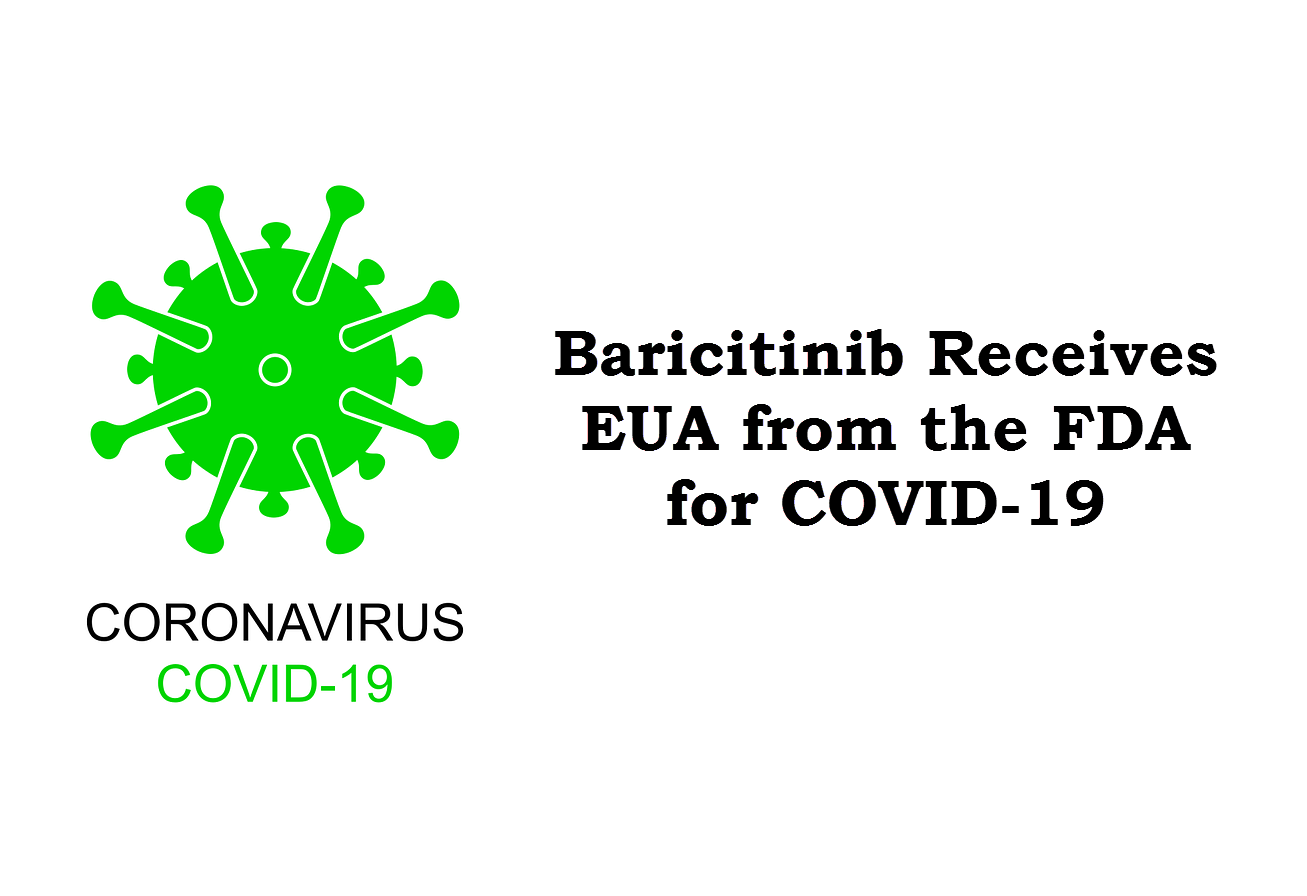
U.S. Food and Drug Administration (FDA) issued an Emergency Use Authorization (EUA) for the distribution and emergency use of baricitinib to be used in combination with remdesivir in hospitalized adult and pediatric patients two years of age or older with suspected or laboratory confirmed COVID-19 who require supplemental oxygen, invasive mechanical ventilation, or extracorporeal membrane oxygenation (ECMO).
"Since the start of the COVID-19 pandemic, Lilly has been committed to finding potential treatments to help people around the world who've been impacted by this virus," said David A. Ricks, Lilly chairman and CEO. "Today's FDA action for baricitinib marks the second Lilly therapy to be granted an EUA, in addition to the recent neutralizing antibody EUA for high-risk non-hospitalized patients, increasing the number of treatment options for COVID-19 patients at different stages of the disease. This is an important milestone for hospitalized patients on oxygen, as baricitinib may help speed their recovery."
The FDA grants emergency use authorization to provide availability of a medicine that may help diagnose, treat or prevent a life-threatening disease when no adequate and approved alternatives are available. This use of baricitinib is authorized only for the duration of the declaration that circumstances exist justifying the authorization of the emergency use, unless the authorization is terminated or revoked sooner. The authorization is temporary and does not replace the formal review and approval process. In the U.S., baricitinib has not been approved by the FDA to treat COVID-19, and the efficacy, safety and optimal duration of treatment of baricitinib for COVID-19 has not been established. This is the first combination regimen authorized by FDA. Evaluation of baricitinib's efficacy and safety as a treatment for COVID-19 is ongoing in clinical trials.
Scientific evidence supporting this EUA:
The EUA is based on data from the Adaptive COVID-19 Treatment Trial (ACTT-2), a randomized double-blind, placebo-controlled study to evaluate the efficacy and safety of baricitinib in combination with remdesivir versus placebo with remdesivir in hospitalized patients with or without oxygen requirements conducted by the National Institute of Allergy and Infectious Diseases (NIAID), part of the National Institutes of Health (NIH). All patients received standard supportive care by the trial site hospital. The recommended dose for this EUA is baricitinib 4-mg once daily for 14 days or until hospital discharge.
Summary of Key Efficacy and Safety Findings
- Patients treated with baricitinib in combination with remdesivir had a significant reduction in median time to recovery from 8 to 7 days (12.5% improvement) compared to remdesivir [hazard ratio: 1.15; 95% CI 1.00, 1.31; p=0.047].
- Patients treated with baricitinib in combination with remdesivir were more likely to have a better clinical status at Day 15 compared to patients treated with remdesivir [odds ratio: 1.26; 95% CI 1.01, 1.57; p=0.044].
- The proportion of patients who progressed to ventilation (non-invasive or invasive) or died by Day 29 was lower in baricitinib in combination with remdesivir (23%) compared to remdesivir (28%) [odds ratio: 0.74; 95% CI 0.56, 0.99; p=0.039].
- The proportion of patients who died by Day 29 was 4.7% for baricitinib in combination with remdesivir vs. 7.1% for remdesivir, a relative reduction of 35% [Kaplan Meier estimated difference in Day 29 probability of mortality: -2.6% (95% CI -5.8%, 0.5%)].
- Adverse events and serious adverse events were reported in 41% and 15% of patients treated with baricitinib in combination with remdesivir, respectively, vs. 48% and 20% in patients treated with remdesivir. Infections and venous thromboembolism (VTE) occurred in 6% and 4% of patients treated with baricitinib in combination with remdesivir, respectively, vs. 10% and 3% of patients treated with remdesivir. No new safety signals were identified for baricitinib-treated patients.
"The results of ACTT-2 provide physicians and the medical community much-needed insights and randomized placebo-controlled evidence supporting the use of baricitinib in combination with remdesivir for the treatment of hospitalized patients with COVID-19; also importantly, the progression to ventilation or death was significantly reduced with the baricitinib-remdesivir combination," said Andre Kalil, M.D., professor at the University of Nebraska Medical Center and a principal investigator of the ACTT studies. "Few treatment options have received an EUA to treat COVID-19 so the authorization of baricitinib is an important step that will give healthcare providers another clinical tool to help patients with advanced disease."
Baricitinib, an oral JAK inhibitor discovered by Incyte and licensed to Lilly, is approved and commercially available as OLUMIANT in the U.S. and more than 70 countries as a treatment for adults with moderate to severe rheumatoid arthritis (RA) and was recently approved in the European Union for the treatment of adult patients with moderate to severe atopic dermatitis who are candidates for systemic therapy.













